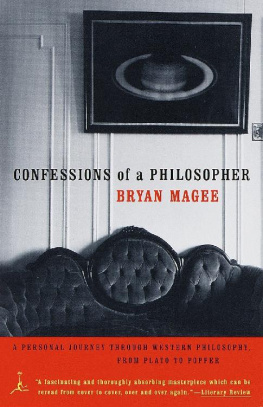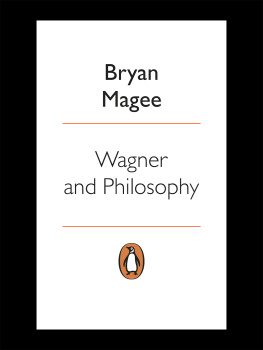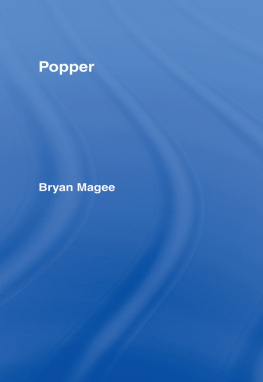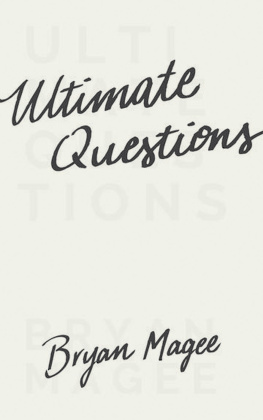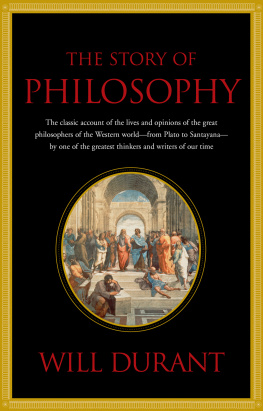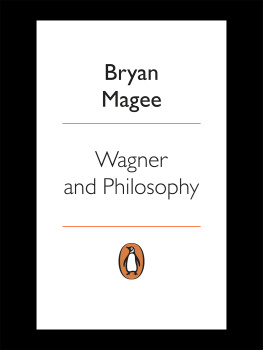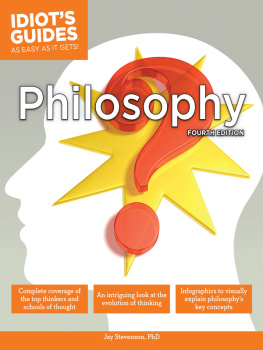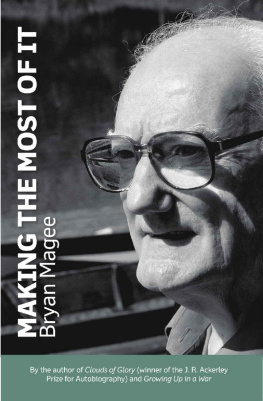ALSO BY BRYAN MAGEE
The New Radicalism
The Democratic Revolution
Aspects of Wagner
Modern British Philosophy
The Gays Among Us
(originally published as One in Twenty)
Men of Ideas
The Philosophy of Schopenhauer
Philosophy and the Real World
(originally published as Karl Popper)
The Great Philosophers
On Blindness
The Story of Thought
Confessions of a
Philosopher
a personal journey through western philosophy from plato to popper
BRYAN MAGEE

THE MODERN LIBRARY
NEW YORK
1999 Modern Library Paperback Edition
Copyright 1997 by Bryan Magee
All rights reserved under International and Pan-American
Copyright Conventions. Published in the United States
by Random House, Inc., New York.
Modern Library and colophon are registered trademarks
of Random House, Inc.
This work was published in hardcover
by Random House in 1998.
This work was originally published in Great Britain
by Weidenfeld & Nicolson, a division of the
Orion Publishing Group Ltd., London, in 1997.
Library of Congress Cataloging-in-Publication Data
Magee, Bryan.
Confessions of a philosopher/Bryan Magee.
p. cm.
Includes index.
ISBN 0-375-75036-3 (pbk.)
1. Magee, Bryan. 2. PhilosophyIntroductions. 3. Philosophers
Great BritainBiography. I. Title.
[B1647.M186A3 1999]
192dc21 [B] 98-32048
Modem Library website address: www.modemlibrary.com
Printed in the United States of America
24689753
For Jenny, Josef in and Niklas
Contents
This book introduces the reader to philosophy and its history through the story of one person's encounter with them. So it is about ideas: the autobiographical element is medium, not message.
Confessions of a
Philosopher
1
Scenes from Childhood
Until I was five I shared a bed with my sister, three and a half years older than me. After our parents had switched out the light we would chatter away in the darkness until we fell asleep. But I could never afterwards remember falling asleep. It was always the same: one moment I was talking to my sister in the dark, and the next I was waking up in a sunlit room having been asleep all night. Yet every night there must have come a time when I stopped talking and settled down to sleep. It was incomprehensible to me that I did not experience that, and never remembered it.
When I confided my bafflement to my sister she was dismissive. "Nobody remembers it," she said in confident tones of finality, as if that were all there was to it. I remained dissatisfied. How does she know? I thought. All that means is she doesn't remember it. I bet she's never talked about it to anybody else. So I set myself to keep a keen watch on my self, so that I would know when I was falling asleep, in the same sort of way as people try to catch the light in a refrigerator going out when they close the door. But it was no use. Everything continued just as before. One moment I'd be chattering away to my sister in the darkness on, say, a Monday evening, and the next thing I knew I'd be waking up in broad daylight and it would be several hours into Tuesday. That going to sleep was something I did every night yet never experienced was for years a source of active mystification to me.
I retain a vivid memory of myself, two or three years after that, when I was seven or eight, standing in a shaft of sunlight in the corner of the kitchen by our back door, between a barred window and a green wooden wall, focusing my eyes keenly on the index finger of my right hand, which I held pointed upwards in front of my face. I'm going to count to three, I was saying to myself, and when I say "three" my finger's going to bend . Then I counted: One, two, thr_ And sure enough on three my finger bent. How did I do it? I did it again. Then I thought: This time I'll count to four . And on four my finger bent. Next time I counted to five. My finger bent on five. I tried dragging out the counting so as to catch my finger out: one, two... three ... four... [wait for it]... five! But on five my finger, not caught napping at all, bent. I could bend my finger whenever I liked. Or not, just as I decided. Yet no matter how hard I concentrated I couldn't grasp anything at all about how I did it. How could something that was so completely within my command, solely and entirely a matter of my own conscious decision, be a nothing for me, just simply no experience whatever, and yet happen? From that day to this the problem has fascinated me.
When I was a teenager, and had acquired the concept of willed activity, and knew that the decision to crook my finger was something taking place in my head, I tried all ways I could think of to catch, in experience, whatever it was that was happening between my brain and my finger. The result was always total failure. I would take the decision inside my head to crook my finger and simultaneously my finger would crook; and between my head and my finger there was an emptiness. The simultaneity presented me with an additional problem: Why wasn't there a time lag? How could a decision be the cause of something that happened at the same time as itself?
For a period of two or three years between the ages of about nine and twelve I was in thrall to puzzlement about time. I would lie awake in bed at night in the dark thinking something along the following lines. I know there was a day before yesterday, and a day before that, and a day before that, and so on, as far back as I can remember. But there must also have been a day before the first day I can remember. I know I was born on 12 April 1930, and there must have been a day before that. And a day before that. And so onand so onand so on. Before every day there must have been a day before. So it must be possible to go back like that for ever and ever and ever ... Yet is it? The idea of going back for ever and ever was something I could not get a hold of: it seemed impossible. So perhaps, after all, there must have been a beginning somewhere. But if there was a beginning, what had been going on before that? Well, obviously, nothingnothing at allotherwise it could not be the beginning. But if there was nothing, how could anything have got started? Where could it have come from? Time couldn't just suddenly pop into existencebingo!out of nothing, and start going, all by itself. Nothing is nothing, not anything. So the idea of a beginning was unimaginable, which somehow made it seem impossible too. The upshot as that it seemed impossible for time to have had a beginning and impossible for it not to have had a beginning.
I must be missing something here, I came to think. There are only these two alternatives, so one of them must be right. They can't both be impossible. So I would switch my concentration from one to the other and then, when it had exhausted itself, back again, trying to work out where I had gone wrong; but I never discovered. I became enslaved by the problem, and started to get lost in it not only in bed at night but increasingly during the day. There were adults who I thought at first might be able to help me, so I put it to them, but their responses left me more bewildered than before. Either they admitted they could not solve it, and then went on to talk about other things, as if this particular question were not interesting enough even to discuss, or else they actively pooh-poohed it with superior little laughs and remarks like "Oh, you don't want to go wasting your time worrying about things like that." I couldn't make this out. If they were as unable as I was to answer the question, how could they feel superior to it? Why weren't they disconcerted, and why didn't they find it even interesting? After several perplexing rebuffs I stopped talking to people about it and just got on with thinking about it by myself.
Next page
